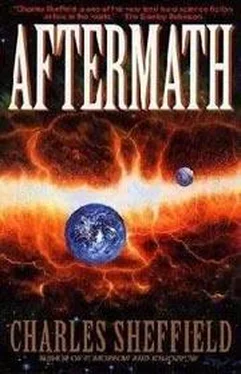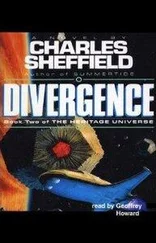But when I became a man, I put away childish things. The Christian Bible, surely. Time is money. Who was that? Harder, but probably Ben Franklin. Saul paused in the outer room, where Auden Travis was giving instructions to three messengers from the Hill.
“Good afternoon, Auden. Would you locate General Mackay, and ask her to come to my office as soon as possible?”
“Very good, sir. I had no idea that you would be here so soon. Secretary Munce was in the building, most anxious to talk to you.”
“Did he specify a subject?”
“No, sir.”
“If he’s still here, tell him to join me and General Mackay. What I have to say is relevant to him, too.”
“Yes, sir.”
“Are you feeling all right, Auden?” Travis seemed different.
“Perfectly fine, Mr. President.”
“Good. Tell General Mackay to come right on in when she gets here. No need to announce her arrival.” Saul continued to his office. If Auden Travis was different, it seemed a change for the better. He was handling the messengers more easily, emphasizing what he wanted but doing it with a joke. Maybe Saul ought to leave the White House more often.
The list of calls on his desk was the same as at Indian Head, with additions and an ordering of priorities. Auden Travis had appended his own notes to some of them:
Sino Consortium, economic collapse reported. Famine, epidemic disease, civil war. SecState seeking policy position. Aid question.
Bad news Hawaii — tsunami, 70-foot crest. Call Sen Kidjel.
Undefined emergency Florida, Seclnt in transit w. Air Force assistance.
Fraser River, Columbia River, Red River, unprecedented flood stage. VP plus governors in best position to handle.
VP: 3 calls from him, no need call back — says best he remain on West Coast pro tern. Reports recovery there slow, but definite.
AgSec says Midwest food shipments resumed, reserves ample, but winter wheat crop total loss. Emergency farm assistance needed Wyoming, Colorado, New Mexico.
Sen Lopez and Cong Mander request meeting ASAP.
EuroPres requests summit soonest. SecState stalling.
GPS back in business.
Air Force report orbiter burn-up in atmosphere. Believes it was failed return of Mars expedition.
Gen Mackay has report on telecommunications activity.
New maps in office show estimated country conditions, weather patterns.
Travis’s staccato style displayed his new confidence. Saul turned to the wall map. It had been drawn on an old flatbed plotter, but the colors and legend were bright and clear.
Blue: infrastructure hurt, but recovering. Green: badly hurt, but recovery likely. Yellow: almost destroyed, no sign yet of recovery. Orange: known total destruction of infrastructure. Red: condition unknown, but destruction presumed total.
You could go around the world, country by country, and note the color code. Brazil was orange. The whole of North America showed blue or green. Central America was mostly orange, as were the Federation of Indian States and the Sino Consortium. Northwest Europe showed blue. Fourteen of the west Asian states were green. Micronesia was red, along with Patagonia and Australia.
Or if you wished, you could stand back and examine not individual states but broad swaths of color. Then the global picture jumped out at you. The world changed from blues and greens in the north to lurid orange and red in the far south. Supernova Alpha had injected its slow heat poison into Earth’s lower hemisphere, and human civilization south of the equator had writhed and died.
There were two exceptions to the general rule. All the Golden Ring countries had been dependent on the microchip technologies. Too dependent. Gold was now orange.
And Africa was a special tragedy. After centuries of failure, technology had taken hold across the continent. The old scourges had seemed defeated. Malaria, malnutrition, river blindness, sleeping sickness, leishmaniasis, yaws, bilharzia, and rift valley fever were everywhere in retreat under the benign rule of the Pan-African Federation.
And now? Now red blanketed the continent from the Mediterranean to the Cape of Good Hope. Ex Africa semper aliquid novi — always something new out of Africa. Except that in Africa itself, nothing new seemed possible. The timeless troubles had won again.
Saul turned to the display of weather vectors. They showed an unusual amount of hemispheric mixing, north and south, but conventional circulation patterns were also appearing. Maybe there would be a fall harvest after all. Earth was shrugging off the effects of Supernova Alpha and fighting back.
The steady click of heels sounded behind him. General Grace Mackay marched in and stood at attention. Saul nodded in greeting.
“Sit down, General. And answer a scientific question for me, if you would be so kind.”
“If I can, sir.” She sat down, but seemed just as much at attention.
“All the extra heat pumped in by Supernova Alpha must be melting a hell of a lot of ice. How much will the sea level be raised when we’re all done?”
“I can’t tell you that, sir, but half the world’s oceanographers must be working on the question. I’m sure that the Deputy Science Adviser could give you an estimate.”
“And I’m sure that anything Dr. Vronsky has to say will be scientifically accurate — and unintelligible. Would you ask him, and give me a translation?”
“I’ll certainly try, sir.” Her confusion showed on her face. “Was that why you wished to speak to me?”
“No. I just thought of that when I was looking at weather patterns. I’ve had something different on my mind for the past few hours. General, tell me about interservice rivalries.”
“It is discouraged and completely prohibited, sir, according to the interservice agreements of ’14.” The smoothness and speed of her answer suggested that the question was no surprise at all.
Saul offered his sunniest smile. “I know that, General. Murder and theft are prohibited, too, under much older statutes. They seem to thrive still.”
“Yes, sir.”
“However, I didn’t ask you here to debate regulations. As you know, today I was at the Indian Head naval base. I saw a wide variety of naval weapons, old but in good working order. I also saw cargo planes, battle helicopters, grenades, rifles, and artillery that didn’t belong in naval operations. I wouldn’t have been surprised to see orbiters and heavy ground tanks.”
“Yes, sir.”
“And on the flight back, I was accompanied by a squadron of Air Force fighters. Did you give orders for that to happen?”
“No, sir, I did not.”
Saul dropped into his chair, leaned back, and adopted a more casual tone. “So here’s my question, Grace. What has your own attitude been for the past two months toward interservice rivalry?”
The steel went out of her backbone, and she, too, leaned back. “I have actively encouraged it, sir. I take full responsibility for my action.”
“I’m sure you do. What I want to understand is the logic behind it.”
“Failing the presence of an external enemy, sir, nothing so provokes a military individual to maximum effort as the chance to advance his or her own service.”
“Army has to beat Navy?”
“Exactly. Sir, if you feel that my actions are contrary to your objectives, then I will be happy—”
“Don’t say it, Grace. Don’t even think it. Your job and mine are the same: we have to pull this country back together as fast as we can. If the services work best to get back in business when they compete, that’s just great. Go on with what you’ve been doing. But now I have another question for you.” Saul paused, his attention drawn to the tall, craggy man who had appeared and stood motionless at the door. “Come in, Mr. Secretary. I’ve got something that should involve you as much as it does General Mackay.”
Читать дальше












